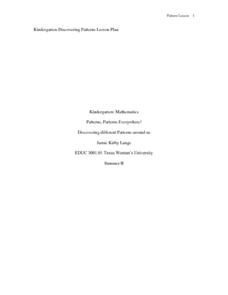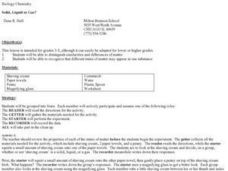Cornell University
Light Waves: Grades 6-8
Explore the behavior of light with different materials. Collaborative groups determine whether certain materials absorb, reflect, diffract, or transmit light waves. They then measure the angle of incidence and angle of reflection.
Curated OER
Estimate How Many Seeds Are In a Fruit or Vegetable
Help mathematicians estimate how many seeds are in a given vegetable or fruit. They are divided into pairs and estimate the amount of seeds in a whole fruit without seeing the inside. They then cut the fruit or vegetable in half and...
Texas Woman’s University
Patterns, Patterns Everywhere!
Not only is pattern recognition an essential skill for young children to develop, it's also a lot of fun to teach! Over the course of this instructional activity, class members participate in shared readings, perform small...
ESL Kid Stuff
Colors
You can sing a rainbow with a fun set of color-themed activities. Kids learn a song, match colors to objects, and jump up and down as they practice their color recognition.
Gatton Park
Magical Maths
A variety of activities take scholars outside the classroom to explore shapes, symmetry, measurement, patterns, sorting, and time in nature. Learners participate individually, and in teams, to measure found objects, go on a...
EngageNY
How Do 3D Printers Work?
If we stack up all the cross sections of a figure, does it create the figure? Pupils make the connection between the complete set of cross sections and the solid. They then view videos in order to see how 3D printers use Cavalerie's...
Anglophone School District
Fluids: Force in Fluids
Discuss Archimedes' Principle and fluid forces with your young scientists as they describe the relationship between mass, volume, and density during a series of engaging activities. They use the Participle Theory of Matter to explore the...
Virginia Department of Education
Average Atomic Masses
Facilitate learning by using small objects to teach the principles of atomic mass in your science class. Pupils determine the average mass of varying beans as they perform a series of competitive experiments. They gather data and...
PHET
Features of the Sun
There are so many things to discover about the sun! Pupils discuss their knowledge of the sun, explore its features, apply their knowledge by labeling photographs, and then reflect on their learning by working in groups to draw and label...
University of Colorado
Strange New Planet
The first remote sensors were people in hot air balloons taking photographs of Earth to make maps. Expose middle school learners to space exploration with the use of remote sensing. Groups explore and make observations of a new...
K5 Learning
Sun, Stars and Moon
Learners read about the objects we see in our night and day skies before answering five short answer comprehension questions.
Teach Engineering
Let's Get it There Fast
Are planes the best shipping method? Using maps, pupils determine the fastest mode of transportation between two cities. Given a list of items to ship, groups decide the best shipping method to finish the 18th segment of a 22-part unit.
Curated OER
The Story of the Solar System
There is more to the solar system than the typical study of the sun and planets. Launch a study of asteroids, meteoroids, and comets by watching the video The Story of the Solar System, available for purchase through this...
Curated OER
Prop Box
What other uses can you brainstorm for a key? What about a pair of sunglasses? Bring a bag of props into your classroom and have learners create different uses for a selection of objects. Then, after everyone has shared, translate the...
Earth Day
Introduction To Scale Drawings
Real-life math is really great! In groups, learners measure objects in the classroom. After comparing measurements, they determine a scale and create a blueprint of the classroom. They discuss the purpose of using scale drawings in...
Curated OER
Investigation- I've Got It
Students practice grouping skills by sorting footwear of the class as a whole group. Activity can be extended by having individual students sort a variety of colored items using a sorting mat.
Curated OER
Counting More and Counting Less
In this counting worksheet, students will count the items in each group and write the numbers on the lines. For the first 6 problems, students will circle the group that has more items. In the last 6, students will circle the group that...
Curated OER
Teen Numbers
Reinforce that numbers in the teens are 10 plus more with this worksheet of 6 practice problems. Children count and circle a group of 10 objects. Then they count on the extras and write the total number in a box. Some sets have the 10...
Curated OER
One Hundred Things
Learners practice estimating by handling items in groups of ten. They visualize how much space 100 items, such as pennies, peas, or beans, will take up after holding 10 of them. Students measure the difference in volume between 10...
Curated OER
DNA in the Garden - Families and Friends: Grouping and Sorting
In this grouping and sorting worksheet, learners learn about sorting objects and living things into larger and smaller groups. They complete an exercise in which they sort cutlery, and then students answer the 3 questions on the page.
LABScI
Harmonic Motion: Pendulum Lab
Several times throughout history, groups of soldiers marching in rhythm across a suspension bridge have caused it to collapse. Scholars experiment with pendulums, resonance, and force to determine why this would happen. First, pupils...
Curated OER
Solid, Liquid, Or Gas?
Students identify physical characteristics and group objects for a picnic using the states of matter for each object and using literature to introduce the states of matter.
Curated OER
Living and Nonliving
Students use their senses to record and collect data. In How Do I Classify Things in My World?, students practice classifying objects as living or nonliving. In Is it Real Or Pretend?, students group objects as real or pretend. In What...
Curated OER
Measurement Worksheet
In this interactive measurement learning exercise, students arrange the six groups of objects according to their height.

























